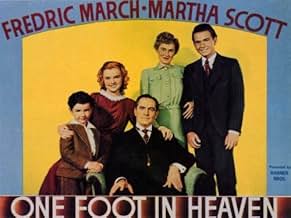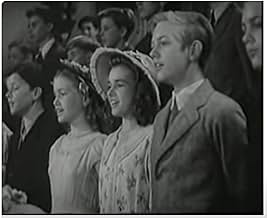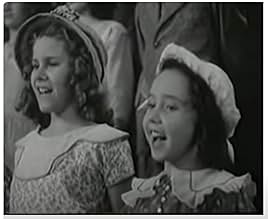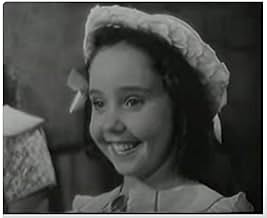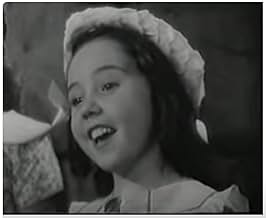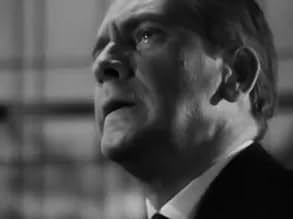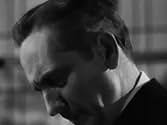NOTE IMDb
6,6/10
1,6 k
MA NOTE
Ajouter une intrigue dans votre langueEpisodic look at the life of a minister and his family as they move from one parish to another.Episodic look at the life of a minister and his family as they move from one parish to another.Episodic look at the life of a minister and his family as they move from one parish to another.
- Réalisation
- Scénario
- Casting principal
- Nommé pour 1 Oscar
- 2 victoires et 1 nomination au total
Dorothy Adams
- Woman Behind Hope at Baptism
- (non crédité)
Joan Anderson
- Child
- (non crédité)
Avis à la une
Witty film that chronicles the career of a Methodist minister and his family over several decades. It was up for Best Picture against "Citizen Kane" and some other well known films, but is less known than the others. You don't have to be Methodist to get the point.
"One Foot in Heaven" is quite simply one of the most beautiful films that I have encountered. A mainstream film of this sort would NEVER even be considered today; it seems even a bit tame for 1940.
And yet, the world was vastly different then, and the gentle,loving tone of this film reflects a sort of "old-time" morality that seems hopelessly lost today.
This was a major Warner Brothers release and, with Hal Wallis as producer, one expects and gets a very high quality film which lovingly recreates scenes from the life of an ordinary Methodist minister during the first 40 years of the 20th century. No earth-shaking events here--just the day-to-day trials and tribulations, the simple joys and heartaches, the small-town politics and frustrations that reveal humanity in all of its imperfections.
I am amazed that Frederic March is sometimes regarded as a dull actor; he was the epitome of subtle, honest realism, and he carries the narrative of this film in an amazing way, tender, gracious, humorous, a bit stodgy--but always willing to "bend" when necessary, resourceful, loving, and above all, very human.
The movie is filled with an array of Hollywood's best character actors, and the extremely detailed sets, costumes, etc really serve as a "window" to another time and place in our American past.
Max Steiner's extremely pious score is almost a bit much at times, but it nonetheless adds a reverent strength to the proceedings.
And then, there is the final scene, one of the most moving and unique in any film that I know. Once again, the ultimate destination of the plot is nothing earth-shaking---but the concept and staging of the last scene is really remarkable. A simple, old-time street on a gorgeous spring day, the townspeople who have come to know and love their minister all stopping their work and joining the procession through the street as they follow the sounds of the carillon from the new church. Martha Scott, Frankie Thomas, Gene Lockhart, Beulah Bondi, Harry Davenport, Laura Hope Crews--many of whom have locked horns with Mr. March during the course of the film, now join together in the dappled sunlit street, finally arriving at the church where they all lift their voices together in the moving hymn "The Church's One Foundation"... as we see Mr. March himself seated at the carillon, struggling to continue playing it through the tears streaming down his face....
I think Turner Classics has a print of this film (I saw and taped it off of Chicago's PBS station some years ago). Try to see it; like the world it represents, this beautiful film may also disappear forever.
And yet, the world was vastly different then, and the gentle,loving tone of this film reflects a sort of "old-time" morality that seems hopelessly lost today.
This was a major Warner Brothers release and, with Hal Wallis as producer, one expects and gets a very high quality film which lovingly recreates scenes from the life of an ordinary Methodist minister during the first 40 years of the 20th century. No earth-shaking events here--just the day-to-day trials and tribulations, the simple joys and heartaches, the small-town politics and frustrations that reveal humanity in all of its imperfections.
I am amazed that Frederic March is sometimes regarded as a dull actor; he was the epitome of subtle, honest realism, and he carries the narrative of this film in an amazing way, tender, gracious, humorous, a bit stodgy--but always willing to "bend" when necessary, resourceful, loving, and above all, very human.
The movie is filled with an array of Hollywood's best character actors, and the extremely detailed sets, costumes, etc really serve as a "window" to another time and place in our American past.
Max Steiner's extremely pious score is almost a bit much at times, but it nonetheless adds a reverent strength to the proceedings.
And then, there is the final scene, one of the most moving and unique in any film that I know. Once again, the ultimate destination of the plot is nothing earth-shaking---but the concept and staging of the last scene is really remarkable. A simple, old-time street on a gorgeous spring day, the townspeople who have come to know and love their minister all stopping their work and joining the procession through the street as they follow the sounds of the carillon from the new church. Martha Scott, Frankie Thomas, Gene Lockhart, Beulah Bondi, Harry Davenport, Laura Hope Crews--many of whom have locked horns with Mr. March during the course of the film, now join together in the dappled sunlit street, finally arriving at the church where they all lift their voices together in the moving hymn "The Church's One Foundation"... as we see Mr. March himself seated at the carillon, struggling to continue playing it through the tears streaming down his face....
I think Turner Classics has a print of this film (I saw and taped it off of Chicago's PBS station some years ago). Try to see it; like the world it represents, this beautiful film may also disappear forever.
one foot in heaven is the type of movie that makes a person want to look into how their life has effected other people. (just as the movie about george baily in it's a wonderful life. a simple story about one man's life and how he was able to do, not exciting things, but long lasting things that made people better for having know him. it is great to find this movie playing on tv, but it should be put on dvd or tape for us to enjoy much more often.
One Foot in Heaven is based on the memoirs of journalist Hartzell Spence's growing up as a Methodist preacher's kid in midwest USA from the Theodore Roosevelt era to the Roaring Twenties. It's what they mean when they talk about a family values film. The Camden Family of Seventh Heaven could well have been modeled on the Spence Family of generations past.
Young William Spence played by Fredric March has abandoned a career in medicine after being saved at a revival meeting and goes all the way and becomes a Methodist minister. Though taken aback by the career change, fiancé Martha Scott still marries him and the story follows them for the next 20 years or so, moving from one parish to another. Scott and March are such a good fit as the preacher and wife you would think that March was doing this with his own wife, Florence Eldridge.
March strikes just the right note as the minister, a just and pious man without being overbearing and sanctimonious. Would that preachers today were like him. He also demonstrates a capacity to learn. When his son goes to the silent cinema in defiance of Methodist preaching against the cinema, March takes him in hand to show him the error of his ways. They go to a William S. Hart western and March to his amazement finds he likes it and the western tale carries a good moral positive moral lesson. He changes his own view on the subject.
He also has to deal with a whole lot of modern day pharisees in dealing with the various politics of every parish he's assigned to. Chief among his tormentors are Beulah Bondi, the richest woman in town, who's actually offended by him treating her gardner Harry Davenport as an equal.
And there's Gene Lockhart who has something of the same role here as in Going My Way. But he's not as nice in this film. When he loses control of the church choir which Lockhart regarded as his private preserve, he and wife Laura Hope Crews mount a vicious smear campaign against March's son Frankie Thomas. His confrontation with Hope Crews and her gossip circle is a high point of the film.
Like Seventh Heaven there are some good humorous moments as well. I like March trolling for some marriage business down at the town clerk's office, looking for some wedding fees when times are a little lean. And the usual problems of dealing with parsonages which are not the most kept up buildings in the town.
The title of the film comes from March's explanation that he and his family have to set an example if in fact his profession puts them one foot in heaven already. It's good entertainment and Fredric March and Martha Scott do set the best example we'll ever see.
Young William Spence played by Fredric March has abandoned a career in medicine after being saved at a revival meeting and goes all the way and becomes a Methodist minister. Though taken aback by the career change, fiancé Martha Scott still marries him and the story follows them for the next 20 years or so, moving from one parish to another. Scott and March are such a good fit as the preacher and wife you would think that March was doing this with his own wife, Florence Eldridge.
March strikes just the right note as the minister, a just and pious man without being overbearing and sanctimonious. Would that preachers today were like him. He also demonstrates a capacity to learn. When his son goes to the silent cinema in defiance of Methodist preaching against the cinema, March takes him in hand to show him the error of his ways. They go to a William S. Hart western and March to his amazement finds he likes it and the western tale carries a good moral positive moral lesson. He changes his own view on the subject.
He also has to deal with a whole lot of modern day pharisees in dealing with the various politics of every parish he's assigned to. Chief among his tormentors are Beulah Bondi, the richest woman in town, who's actually offended by him treating her gardner Harry Davenport as an equal.
And there's Gene Lockhart who has something of the same role here as in Going My Way. But he's not as nice in this film. When he loses control of the church choir which Lockhart regarded as his private preserve, he and wife Laura Hope Crews mount a vicious smear campaign against March's son Frankie Thomas. His confrontation with Hope Crews and her gossip circle is a high point of the film.
Like Seventh Heaven there are some good humorous moments as well. I like March trolling for some marriage business down at the town clerk's office, looking for some wedding fees when times are a little lean. And the usual problems of dealing with parsonages which are not the most kept up buildings in the town.
The title of the film comes from March's explanation that he and his family have to set an example if in fact his profession puts them one foot in heaven already. It's good entertainment and Fredric March and Martha Scott do set the best example we'll ever see.
Of course, it's impossible to tell how much of this story is dramatized and how much is real. And the gothic ideals of what a "church" should be are now very period--as they should be. But what makes this film work is the human nature presented through the characters. I say this because, as a (United) Methodist pastor, I know and have known the very types of characters represented in this film. And as one who sometimes wonders whether I'm fulfilling the mandate of my calling, this film was a welcome and refreshing reminder of maintaining my focus. It is probably a good insight for church members who want to get a glimpse of what life is truly like for a clergy person, then as now (though my parsonage is countless times better than what poor Dr. Spence had to live with!). A recommended dose of reality for the clergy-weary and the clergy-wary alike!
Le saviez-vous
- AnecdotesWilliam S. Hart was the guest of honor at the Hollywood premiere of this movie, since his movie Le droit d'asile (1917) figures prominently in the plot.
- GaffesAt the beginning of the movie, William Spence (Fredric March) announces he has been "called" to the church and will become a pastor in the Methodist Church. His soon-to-be mother-in-law, Mrs. Norris (Nana Bryant)), replies that she would have preferred that he'd joined the Episcopal Church. At that time, in Canada, the dominant church was the Church of England, not the Episcopal Church. That is predominantly a US institution born out of the American Revolution.
- Citations
William Spence: [to his son, Hartzell] A pastor's family are in a special category. We are uh... Well, It's as if we walked a sort of tightrope. Balancing with one foot on earth and one foot already in heaven.
- ConnexionsEdited into Happy Times and Jolly Moments (1943)
- Bandes originalesThe Children's Prayer
(uncredited)
from "Hansel and Gretel"
Music by Engelbert Humperdinck
Libretto by Adelheid Wette
Sung by the Robert Mitchell Choir
Meilleurs choix
Connectez-vous pour évaluer et suivre la liste de favoris afin de recevoir des recommandations personnalisées
Everything New on HBO Max in June
Everything New on HBO Max in June
Looking for something different to add to your Watchlist? Take a peek at what movies and TV shows are coming to HBO Max this month.
Détails
- Date de sortie
- Pays d’origine
- Langue
- Aussi connu sous le nom de
- Con un pie en el cielo
- Lieux de tournage
- Société de production
- Voir plus de crédits d'entreprise sur IMDbPro
- Durée1 heure 48 minutes
- Couleur
- Rapport de forme
- 1.37 : 1
Contribuer à cette page
Suggérer une modification ou ajouter du contenu manquant

Lacune principale
By what name was Au seuil du paradis (1941) officially released in India in English?
Répondre

